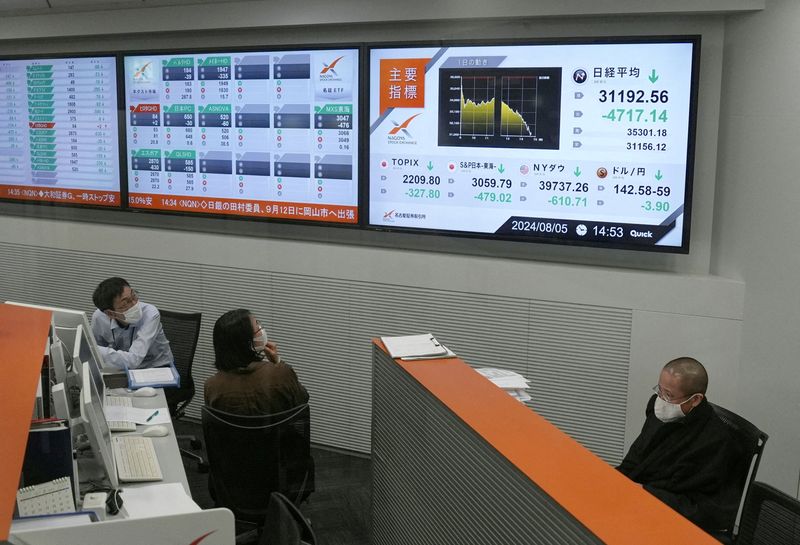By Sam Nussey and Daniel Leussink
TOKYO (Reuters) -A resurgent yen helped bring Japanese stocks crashing back to earth on Monday, leaving investors scrambling to gauge the potentially diminished outlook for earnings, and snuffing out a months-long dramatic run by the Tokyo market.
In just three trading sessions the Nikkei share average has lost a fifth of its value. On Monday it tumbled 12.4%, marking its second-largest decline on record and its biggest since the Black Monday crash of October 1987.
In part, the sell-off has been driven by the recent turnaround in the yen after the Bank of Japan began to raise rates for the first time in decades, most recently last week.
Now investors are forced to size up Japan Inc's prospects without the extra cushion from the currency, which has helped many heavyweight exporters. Up until a few days ago, the Japanese stock market was seen as a global stand-out, having gained almost 30% last year and touching a lifetime high last month.
"All the benefits, all the tailwinds from forex that have been propping up Nikkei 225 stocks and exporters, multinationals, it's all gone," said Amir Anvarzadeh of Asymmetric Advisors, a Japan-focused equity advisory firm.
Now, companies now will have to do well on their own merits, he said.
A weaker yen drives up cost for small businesses and households, but it is largely positive for big exporters, such as Toyota Motor (NYSE:TM), because it makes their products cheaper overseas and boosts profits when foreign earnings are brought home.
The yen traded around its strongest level in seven months on Monday, at 142 to the dollar. It has gained about 14% over the last month, recovering after months of losses.
To get a sense of the size of the potential disruption for Japan's industrial giants, one need look no further than Toyota. The world's largest automaker says every 1 yen change against the dollar means a difference of 50 billion yen ($350 million) in profit.
At Toyota's latest quarterly earnings, announced last week, the currency contributed 370 billion yen to operating profit.
The selling has spread beyond exporters, with banks and other industries also shredded, casting a cloud over the Japanese market's recent comeback, which was seen as a triumphant revival after years in deflationary doldrums.
FUNDAMENTALS SOLID
While corporate Japan's fundamentals remain largely solid, analysts said, the sell-off is a reminder that markets - at least in the short-term - do not always reflect fundamentals.
With many exporters assuming a yen exchange rate of 140 or 145 to the dollar, investors had been expecting to see stronger earnings ahead given the yen traded at 160 a few weeks ago, said Kei Okamura, a portfolio manager at Neuberger Berman in Tokyo.
"A lot of global investors have been looking for Japanese companies to announce upward revisions" due to the currency, he said.
"That's why from some people's perspective the upward revisions might not be there, but from our perspective, the fundamentals still look okay."
Exporters' shares were also hit by concerns about a slowdown in the United States, one of Japan's biggest export markets, and one absolutely vital to its auto industry.
"If the U.S. economy slows down, cars won't sell," said Takatoshi Itoshima, a strategist at Pictet Asset Management Japan.
Automakers are also heavyweight components of the Nikkei and the broader Topix index, Itoshima said, something that adds to the overall pain for markets.
Subaru (OTC:FUJHY), which reported that almost 80% of its revenue came from North America in the first quarter, on Monday said it was sticking by its forecast for a 142 yen exchange rate for the full year.
Chief Financial Officer Katsuyuki Mizuma told an earnings briefing the automaker would have to take a look at the incentives it offers in the United States. Every 1 yen increase in the exchange rate meant a shift in 10 billion yen of operating profit, he said.
Printer maker Epson last week said it was revising its exchange rate assumption to 151 yen to the dollar from 144 yen previously - and lifting its profit outlook as a result, which now may look in doubt.
The market turmoil may come with a silver lining for investors who look beyond a group of Japan's export champions.
The yen's reversal could offer relief to the broader economy after its months-long decline has pushed up consumer prices, raising deep concerns about the outlook for spending in Japan.
The yen's decline has even prompted the founder of Uniqlo parent Fast Retailing to warn there was "no merit" to a weaker yen, given that Japan imports raw materials from all over the world before manufacturing and exporting.
"A stronger yen might not be good for the Nikkei 225 stocks and the foreigners owning it," said Anvarzadeh of Asymmetric Advisors.

"But it's good for the country, it's good for the economy."
($1 = 142.7500 yen)